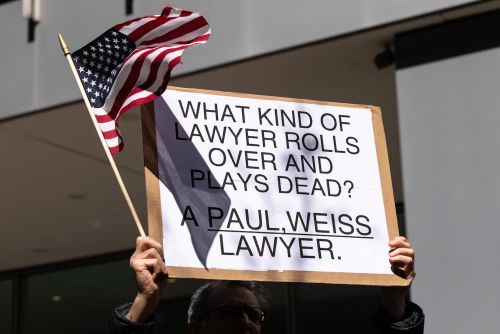

Whether these attacks will escalate or fade will depend in part on the willingness of the legal profession to stand united.

By Matthew A. McIntosh
Public Historian
Brewminate
A New Front in Political Retaliation
Donald Trump’s latest strategy for consolidating power has moved into territory that even seasoned political observers find unsettling. Over the past few months, he has been targeting lawyers and law firms that represent clients or causes opposed to his policies, publicly branding them as political enemies and, in some cases, hinting at professional or financial consequences.
While political leaders have often criticized court decisions or the lawyers who argue them, Trump is notable for his directness and breadth of reach in an environment open to it. His language has been designed not only to discredit the positions taken in court but to undermine the very legitimacy of attorneys who stand against his administration’s aims.
The ABA and the Profession Respond
The American Bar Association, typically cautious in weighing into partisan disputes, issued a statement condemning any effort by political figures to intimidate or punish lawyers for their representation choices. The ABA warned that such tactics threaten the principle of independent legal advocacy, a cornerstone of the American judicial system. They filed suit against him to cease and desist.
In measured but pointed terms, the statement emphasized that the role of a lawyer is to represent clients zealously within the bounds of the law, regardless of personal politics or the political winds of the moment. Interfering with that duty, the ABA argued, strikes at the heart of due process.
Several state bar associations have joined the chorus, underscoring that the profession’s ethical code is designed to protect unpopular clients and contentious causes alike. In their view, a justice system where lawyers must weigh political backlash before taking a case is one that no longer functions as intended.
Historical Echoes and Contemporary Risks
There is precedent for political leaders attempting to chill legal opposition. From the anti-communist loyalty oaths of the 1950s to the attacks on civil rights lawyers in the 1960s, the legal profession has faced moments when representing certain clients carried personal and professional risks. Yet there is a difference between ambient public hostility and a coordinated effort by a sitting president to single out and stigmatize attorneys by name.
Today’s legal community operates in an environment far more connected and volatile than in earlier decades. Public condemnation from the White House can trigger waves of online harassment, targeted disinformation, and even threats of violence. Lawyers targeted in Trump’s recent speeches have already reported an uptick in security concerns. Some have increased physical protections at their offices or changed digital communication practices to guard against intrusion.
Chilling Effect on Legal Advocacy
The practical danger is not merely reputational. By signaling that lawyers who oppose his administration will be treated as adversaries beyond the courtroom, Trump risks creating a chilling effect on legal advocacy. Attorneys may decline to take on certain cases, not because the law or the facts are against them, but because the political costs to their firm or their personal safety feel too high.
This is not a theoretical concern. Civil rights groups have already reported difficulty in recruiting pro bono counsel for cases challenging federal policies viewed as politically explosive. Law firms, particularly those with corporate clients that value a low-profile public image, are keenly aware of the potential for being drawn into political crossfire.
The Politics of Targeting the Legal System
The move to target lawyers fits into a broader pattern in Trump’s political playbook. Institutions that resist his agenda, from the press to intelligence agencies, have been reframed as part of a hostile “establishment” working against the people. The judiciary, while more complex to vilify given his own judicial appointments, is now joined in that category by the legal professionals who contest his administration’s actions in court.
By positioning these lawyers as partisan operatives rather than independent advocates, Trump reframes legal opposition as illegitimate by definition. It is a rhetorical tactic that blurs the distinction between disagreement and disloyalty, which in a democratic system should remain sharply drawn.
The Stakes for the Rule of Law
The longer-term concern is that such attacks could normalize political interference with the right to counsel. If one administration can openly target lawyers for their clients, a precedent is set that future leaders could exploit. The United States’ legal system is predicated on the idea that representation is available without fear of reprisal, even in cases that pit the lawyer against the most powerful figures in government.
The ABA’s response is a reminder that the profession sees this moment as more than a political skirmish. It is a test of whether the core principles of legal advocacy (independence, confidentiality, and loyalty to the client) can withstand direct pressure from the political branch.
A Fragile Equilibrium
Whether these attacks will escalate or fade will depend in part on the willingness of the legal profession to stand united, and on the public’s capacity to understand that defending the right to representation is not the same as endorsing the client’s cause. For now, the legal community finds itself in a familiar but uncomfortable position: defending the integrity of the system against forces that see that integrity as an obstacle. The stakes extend far beyond the fate of any single case or lawyer. At risk is the quiet but essential assumption that the law can still be argued on its merits, without fear that the lawyer’s livelihood will be sacrificed on the altar of political retribution.
Originally published by Brewminate, 08.18.2025, under the terms of a Creative Commons Attribution-NonCommercial-NoDerivatives 4.0 International license.


